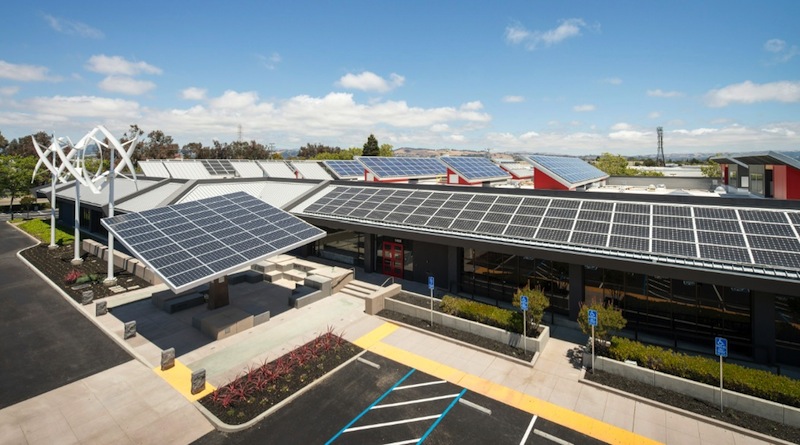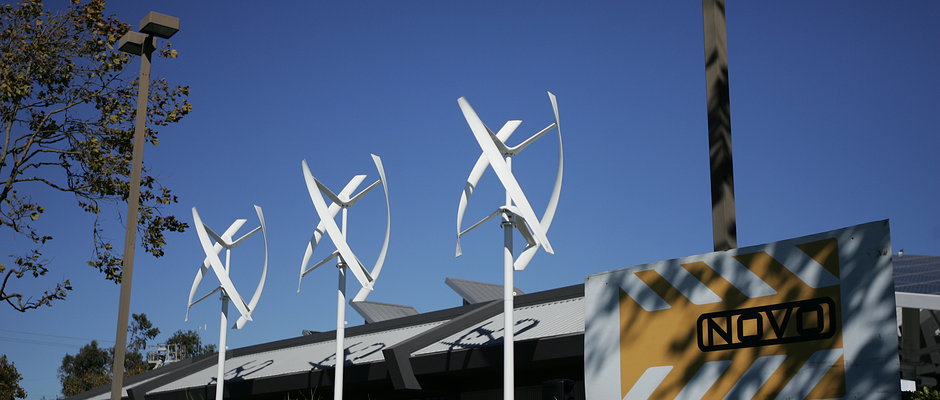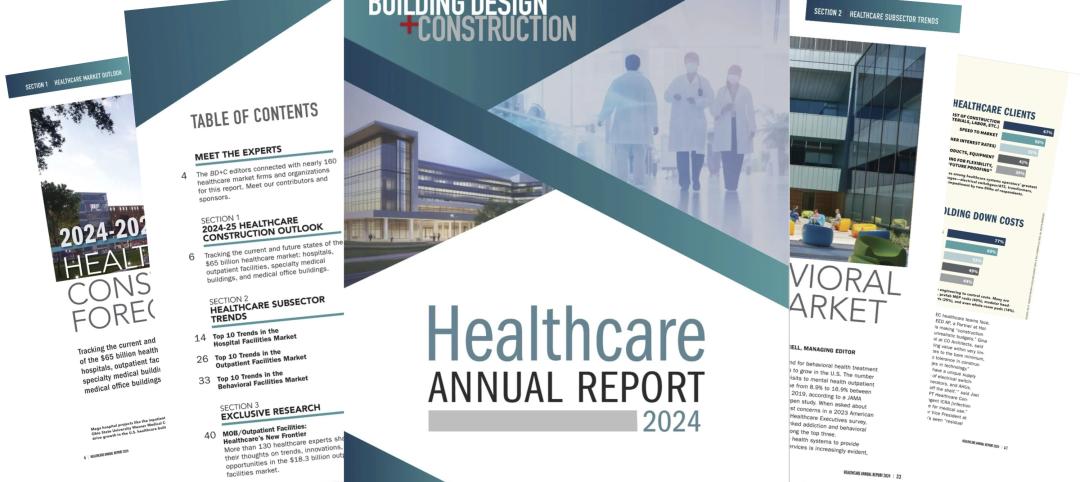The International Brotherhood of Electrical Workers and the National Electrical Contractors Association announced the grand opening of the Zero Net Energy Center (www.znecenter.org).
Located in San Leandro, Calif., the ZNE Center is the first commercial building retrofit designed to meet the U.S. Department of Energy’s requirements for a “zero net energy” building.
The 46,000-sf structure is an educational facility for 2,000 electrical workers that will participate in a program run by IBEW Local 595 and the Northern California Chapter of NECA. The ZNE Center officially opens its doors as the educational facility for over 2,000 apprentice and journey-level electricians in Alameda County and to serve as an industry-wide resource.
Courtesy Environmental Building Strategies (EBS). CLICK IMAGE TO ENLARGE.
“The building is a true game changer for our industry,” said Victor Uno, Business Manager for IBEW Local 595. “We are proud to push the envelope in the areas of energy conservation efforts, renewable energy promotion, job creation, work-force training and labor-management cooperation.”
Energy Efficiency and Renewable Energy
The ZNE Center exceeds the state of California’s 2030 energy efficiency effort by meeting the zero net goal 17 years in advance. It also exceeds the energy conservation goals of the Obama administration’s Better Buildings Challenge.
“We look forward to sharing how we utilized new technologies, advanced building designs, and innovative construction methods to achieve a dramatic and unprecedented 75% reduction in energy use when compared to similar existing commercial buildings in the country," said Don Campbell Executive Director of NECA’s Northern California Chapter. “This energy savings lowers the ZNE Center’s carbon footprint by 175 tons of CO2 per year, equal to the carbon emitted by 30 passenger vehicles annually as well as a savings of 500 barrels of oil each year.”
The ZNE Center exemplifies the importance of deep and early collaboration of the entire design and construction team. Under the leadership of IBEW/NECA, the team included Environmental Building Strategies (EBS), NOVO Construction, FCGA Architects, Belden Consulting Engineers, Red Top Electric, ACCO Mechanical, and Cubed Energy Solutions.
Project overview and sustainability stats
· The ZNE Center is the new home of the IBEW Local 595 and the Northern California Chapter of NECA Joint Apprenticeship and Training Committee program, where apprentices will train on the renewable energy and passive design systems incorporated into the building.
· Their goal is to make the ZNE Center the hallmark of energy efficiency and training for the construction industry nation-wide, incorporating a vision for a more sustainable world where young men and women will be trained for good paying jobs and careers in the electrical industry.
· The 46,000-sf building is the first retrofit of an existing commercial building for education and training that meets the U.S. Department of Energy standards for a “zero net energy” building. It exceeds California’s 2030 zero net energy goal 17 years in advance, and also exceeds the goals of Obama’s Better Buildings Challenge.
· 50% lighting energy reduction through daylighting, occupancy sensors, LEDs, solar tubes and more
· 80% HVAC energy reduction
· 90% computer energy reduction by upgrading equipment to Energy Star certified
· 75% reduction in energy use compared to similar U.S. buildings, and 29% energy use reduction compared to new commercial construction in California.
Related Stories
Codes and Standards | Jul 15, 2024
New York City code update changes definition of a major building
Changes affecting how construction projects in New York City are permitted will have significant impacts for contractors. On Dec. 11, the definition of a major building in the city’s code will change from 10 stories to seven, or 75 feet. The change will affect thousands more projects.
Adaptive Reuse | Jul 12, 2024
Detroit’s Michigan Central Station, centerpiece of innovation hub, opens
The recently opened Michigan Central Station in Detroit is the centerpiece of a 30-acre technology and cultural hub that will include development of urban transportation solutions. The six-year adaptive reuse project of the 640,000 sf historic station, created by the same architect as New York’s Grand Central Station, is the latest sign of a reinvigorating Detroit.
University Buildings | Jul 11, 2024
3 considerations for designing healthy, adaptable student dining
Amanda Vigneau, IIDA, NCDIQ, LEED ID+C, Director, Shepley Bulfinch, shares three ways student dining facilities have evolved to match changes in student life.
Healthcare Facilities | Jul 11, 2024
New download: BD+C's 2024 Healthcare Annual Report
Welcome to Building Design+Construction’s 2024 Healthcare Annual Report. This free 66-page special report is our first-ever “state of the state” update on the $65 billion healthcare construction sector.
Transit Facilities | Jul 10, 2024
Historic Fresno train depot to be renovated for California high speed rail station project
A long-shuttered rail station in Fresno, Calif., will be renovated to serve as the city’s high speed rail (HSR) station as part of the California High-Speed Rail Authority system, the nation’s first high speed rail project. California’s HSR system will eventually link more than 800 miles of rail, served by up to 24 stations.
Government Buildings | Jul 8, 2024
GSA adopts new accessibility guidelines for federal properties
The U.S. General Services Administration (GSA) adopted a new rule with new accessibility guidelines for federal buildings. The rule establishes that pedestrian facilities in the public right-of-way are readily accessible to and usable by people with disabilities.
Office Buildings | Jul 8, 2024
Office vacancy peak of 22% to 28% forecasted for 2026
The work from home trend will continue to put pressure on the office real estate market, with peak vacancy of between 22% and 28% in 2026, according to a forecast by Moody’s.
Virtual Reality | Jul 8, 2024
Can a VR-enabled AEC firm transform your project?
With the aid of virtual reality and three-dimensional visualization technologies, designers, consultants, and their clients can envision a place as though the project were in a later stage.
Green | Jul 8, 2024
Global green building alliance releases guide for $35 trillion investment to achieve net zero, meet global energy transition goals
The international alliance of UK-based Building Research Establishment (BRE), the Green Building Council of Australia (GBCA), the Singapore Green Building Council (SGBC), the U.S. Green Building Council (USGBC), and the Alliance HQE-GBC France developed the guide, Financing Transformation: A Guide to Green Building for Green Bonds and Green Loans, to strengthen global cooperation between the finance and real estate sectors.
Codes and Standards | Jul 8, 2024
New York State building code update would ban fossil fuels in new buildings
New York’s Building Code Council is set to include the All-Electric Buildings Act in its 2025 code update. The Act would ban natural gas and other fossil fuels in new buildings.



















